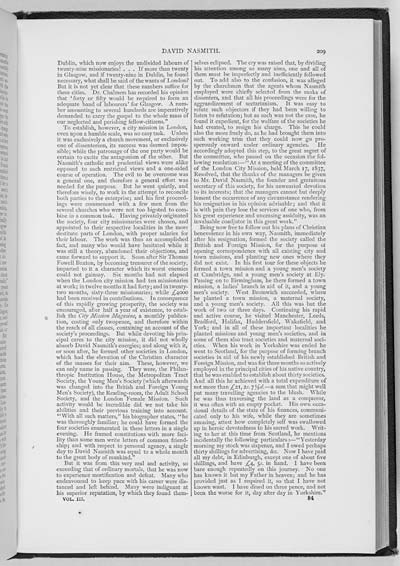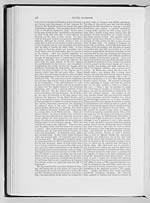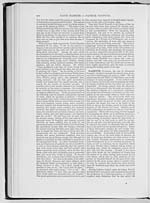209
Dublin, which now enjoys the undivided labours of
twenty-nine missionaries! . . . If more than twenty
in Glasgow, and if twenty-nine in Dublin, be found
necessary, what shall be said of the wants of London?
But it is not yet clear that these numbers suffice for
these cities. Dr. Chalmers has recorded his opinion
that 'forty or fifty would be required to form an
adequate band of labourers' for Glasgow. A num-
ber amounting to several hundreds are imperatively
demanded to carry the gospel to the whole mass of
our neglected and perishing fellow-citizens."
To establish, however, a city mission in London,
even upon a humble scale, was no easy task. Unless
it was exclusively a church movement, or exclusively
one of dissenterism, its success was deemed impos-
sible; while the patronage of the one party would be
certain to excite the antagonism of the other. But
Nasmith's catholic and prudential views were alike
opposed to such restricted views and a one-sided
course of operation. The evil to be overcome was
a general one, and therefore a general effort was
needed for the purpose. But he went quietly, and
therefore wisely, to work in the attempt to reconcile
both parties to the enterprise; and his first proceed-
ings were commenced with a few men from the
several churches who were not too bigoted to com-
bine in a common task. Having privately originated
the society, four city missionaries were chosen, and
appointed to their respective localities in the more
destitute parts of London, with proper salaries for
their labour. The work was thus an accomplished
fact, and many who would have hesitated while it
was still a theory, abandoned their objections, and
came forward to support it. Soon after Sir Thomas
Fowell Buxton, by becoming treasurer of the society,
imparted to it a character which its worst enemies
could not gainsay. Six months had not elapsed
when the London city mission had ten missionaries
at work; in twelve months it had forty; and in twenty-
two months, sixty-three missionaries; while �4000
had been received in contributions. In consequence
of this rapidly growing prosperity, the society was
encouraged, after half a year of existence, to estab-
lish the City Mission Magazine, a monthly publica-
tion, costing only twopence, and therefore within
the reach of all classes, containing an account of the
society's proceedings. But while devoting his prin-
cipal cares to the city mission, it did not wholly
absorb David Nasmith's energies; and along with it,
or soon after, he formed other societies in London,
which had the elevation of the Christian character
of the masses for their aim. These, however, we
can only name in passing. They were, the Philan-
thropic Institution House, the Metropolitan Tract
Society, the Young Men's Society (which afterwards
was changed into the British and Foreign Young
Men's Society), the Reading-room, the Adult School
Society, and the London Female Mission. Such
activity would be incredible did we not take his
abilities and their previous training into account.
"With all such matters," his biographer states, "he
was thoroughly familiar; he could have formed the
four societies enumerated in these letters in a single
evening. He framed constitutions with more faci-
lity than some men write letters of common friend-
ship; and with respect to personal agency, a single
day to David Nasmith was equal to a whole month
to the great body of mankind."
But it was from this very zeal and activity, so
exceeding that of ordinary mortals, that he was now
to experience mortification and defeat. Many who
endeavoured to keep pace with his career were dis-
tanced and left behind. Many were indignant at
his superior reputation, by which they found them-
VOL. III.
selves eclipsed. The cry was raised that, by dividing
his attention among so many aims, one and all of
them must be imperfectly and inefficiently followed
out. To add also to the confusion, it was alleged
by the churchmen that the agents whom Nasmith
employed were chiefly selected from the ranks of
dissenters, and that all his proceedings were for the
aggrandizement of sectarianism. It was easy to
refute such objectors if they had been willing to
listen to refutation; but as such was not the case, he
found it expedient, for the welfare of the societies he
had created, to resign his charge. This he could
also the more freely do, as he had brought them into
such working trim that they could now go pro-
sperously onward under ordinary agencies. He
accordingly adopted this step, to the great regret of
the committee, who passed on the occasion the fol-
lowing resolution:�"At a meeting of the committee
of the London City Mission, held March 17, 1837,
Resolved, that the thanks of the managers be given
to Mr. David Nasmith, the founder and gratuitous
secretary of this society, for his unwearied devotion
to its interests; that the managers cannot but deeply
lament the occurrence of any circumstance rendering
his resignation in his opinion advisable; and that it
is with pain they lose the services of one who, from
his great experience and unceasing assiduity, was an
invaluable coadjutor in this great work."
Being now free to follow out his plans of Christian
benevolence in his own way, Nasmith, immediately
after his resignation, formed the society called the
British and Foreign Mission, for the purpose of
opening correspondence with all existing city and
town missions, and planting new ones where they
did not exist. In his first tour for these objects he
formed a town mission and a young men's society
at Cambridge, and a young men's society at Ely.
Passing on to Birmingham, he there formed a town
mission, a ladies' branch in aid of it, and a young
men's society. West Bromwich succeeded, where
he planted a town mission, a maternal society,
and a young men's society. All this was but the
work of two or three days. Continuing his rapid
and active course, he visited Manchester, Leeds,
Bradford, Halifax, Huddersfield, Wakefield, and
York; and in all of these important localities he
planted missions and young men's societies, and in,
some of them also tract societies and maternal soci-
eties. When his work in Yorkshire was ended he
went to Scotland, for the purpose of forming branch
societies in aid of his newly established British and
Foreign Mission, and was for three months so actively
employed in the principal cities of his native country,
that he was enabled to establish about thirty societies.
And all this he achieved with a total expenditure of
not more than �21, 2s. 7�d.�a sum that might well
put many travelling agencies to the blush. While
he was thus traversing the land as a conqueror,
it was often with an empty pocket. His own occa-
sional details of the state of his finances, communi-
cated only to his wife, while they are sometimes
amusing, attest how completely self was swallowed
up in heroic devotedness to his sacred work. Writ-
ing to her at this time from Scotland, he mentions
incidentally the following particulars:�"Yesterday
morning my stock was sixpence, and I owed perhaps
thirty shillings for advertising, &c. Now I have paid
all my debt, in Edinburgh, except one of about five
shillings, and have �4, 5s. in hand. I have been
bare enough repeatedly on this journey. No one
has known it but my Father in heaven; and he has
provided just as I required it, so that I have not
known want. I have dined on three pence, and not
been the worse for it, day after day in Yorkshire."
84

![]() Universal Viewer |
Universal Viewer | ![]() Mirador |
Large image | Transcription
Mirador |
Large image | Transcription
![]()

